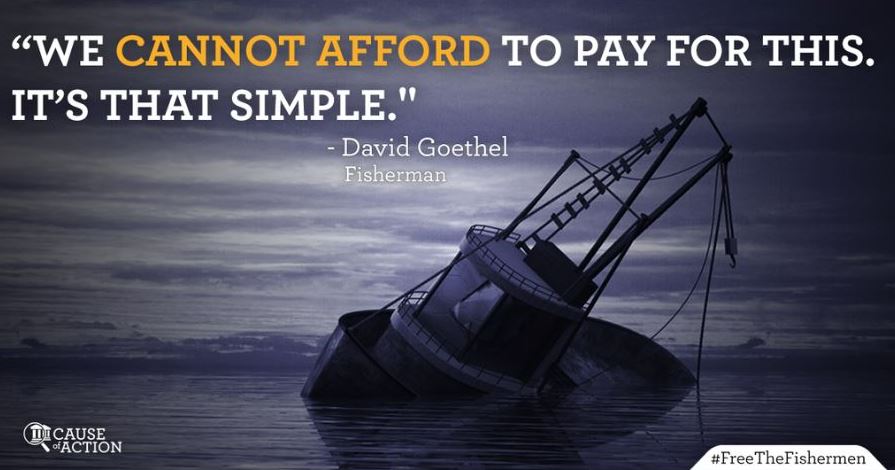Share your story with us!
From March 17th – 19th, Cause of Action Institute will be at the Seafood Expo North America in Boston, Massachusetts. Come visit us in Booth 2667 to learn more about our work defending the rights and economic freedoms of commercial fishermen. Can’t come see us? Contact us at fish@causeofaction.org, or share your story with us here.

For years, Cause of Action has monitored and brought legal challenges against overregulation of our nation’s fisheries and its negative economic impact on fishing communities. We represented David Goethel and a group of New England fishermen in a lawsuit challenging the government’s decision to force monitoring costs, estimated at $710 per day, onto the fleet. CoA Institute also filed an amicus brief in support of fisherman John Yates, whom the federal government targeted in a case of prosecutorial overreach when it accused him of violating corporate finance laws for allegedly throwing fish overboard.
CoA is currently following the development of the New England IFM Omnibus Amendment, which would introduce industry-funded monitoring in the Atlantic herring fishery and filed numerous public comments against it.
Our Work
John Yates v. United States
John Yates was once facing jail time for 3 missing fish. Yates v. U.S. was an opportunity for the Supreme Court to check government over-reach and over-criminalization. A fisherman who allegedly threw overboard some undersized fish should not be prosecuted and imprisoned under a law written to prevent big corporate executives from shredding documents to cover financial fraud. Read more about this case here.
Goethel v. Pritzker
In November 2015, the Department of Commerce mandated that sector fishermen who fish for cod, flounder, and other groundfish, must not only carry third-party contractors known as “at-sea monitors” on their vessels during fishing trips, but also pay out-of-pocket for the cost of those monitors. Cause of Action Institute represented a group of east coast fishermen, led by David Goethel, in a lawsuit against the U.S. Department of Commerce challenging the National Oceanic and Atmospheric Administration’s decision to force at-sea monitoring costs onto fishermen. Learn more about this case here.
United States v. Black
Cause of Action defended Nancy Black, a highly-esteemed marine biologist who researches the lives and behavior of killer whales. She was criminally charged with violating a Marine Mammal Protection Act (MMPA) regulation prohibiting feeding marine mammals in the wild. Every other alleged violation of this regulation has resulted in relatively modest fines or, in a recent case with far more egregious facts, forfeiture of a privately owned vessel. Here, however, the government’s original charges could have resulted in as long as 27 years in prison, a $700,000 fine and forfeiture of her research vessel. Nancy’s defense team was able to resolve the case through a plea agreement substituting any possible jail time for misdemeanor charge involving improper feeding. Read more about Nancy’s story here.
Omnibus Amendment
In September 2018, the New England Fishery Management Council (NEFMC), in coordination with the National Marine Fisheries Service (NMFS), a component of NOAA, sought approval for a controversial set of regulatory measures known as the New England Industry-Funded Monitoring Omnibus Amendment. The Omnibus Amendment would create a new financial burden on fishermen by mandating that they pay as much as $810 per sea day for at-sea monitoring in the Atlantic herring fishery. It would also create a standardized process for introducing similar costly monitoring requirements to other New England fisheries.
CoA Institute argued in its initial public comment on the Omnibus Amendment that the burdensome monitoring would unfairly and unlawfully restrict economic opportunity in the fishery. Aside from the questionable legal authority to create this effective new tax on fishermen, the $810-per-sea-day cost has the potential to wipe out the narrow margins that small-scale fishermen rely on to survive.
Following the publication of the notice of availability for the Omnibus Amendment, but before any approval decision was made, the agency oddly proposed implementing regulations in November 2018. Again, CoA Institute filed a public comment in opposition to the regulations, once again reiterating the legal infirmities with the funding scheme and, among other things, highlighted fatal flaws in the rulemaking’s Environmental Assessment.
CoA Institute then discovered a letter from the Regional Administrator for NMFS’s Greater Atlantic Regional Office suggesting that Commerce had already approved the Omnibus Amendment, despite the fact that nothing had been published in the Federal Register, posted to NMFS’s herring bulletin, or communicated to the general public. In February, CoA sent a letter to U.S. Department of Commerce Secretary Wilbur Ross criticizing his office’s lack of transparency and inadequate analysis surrounding the controversial fishery management regulations.